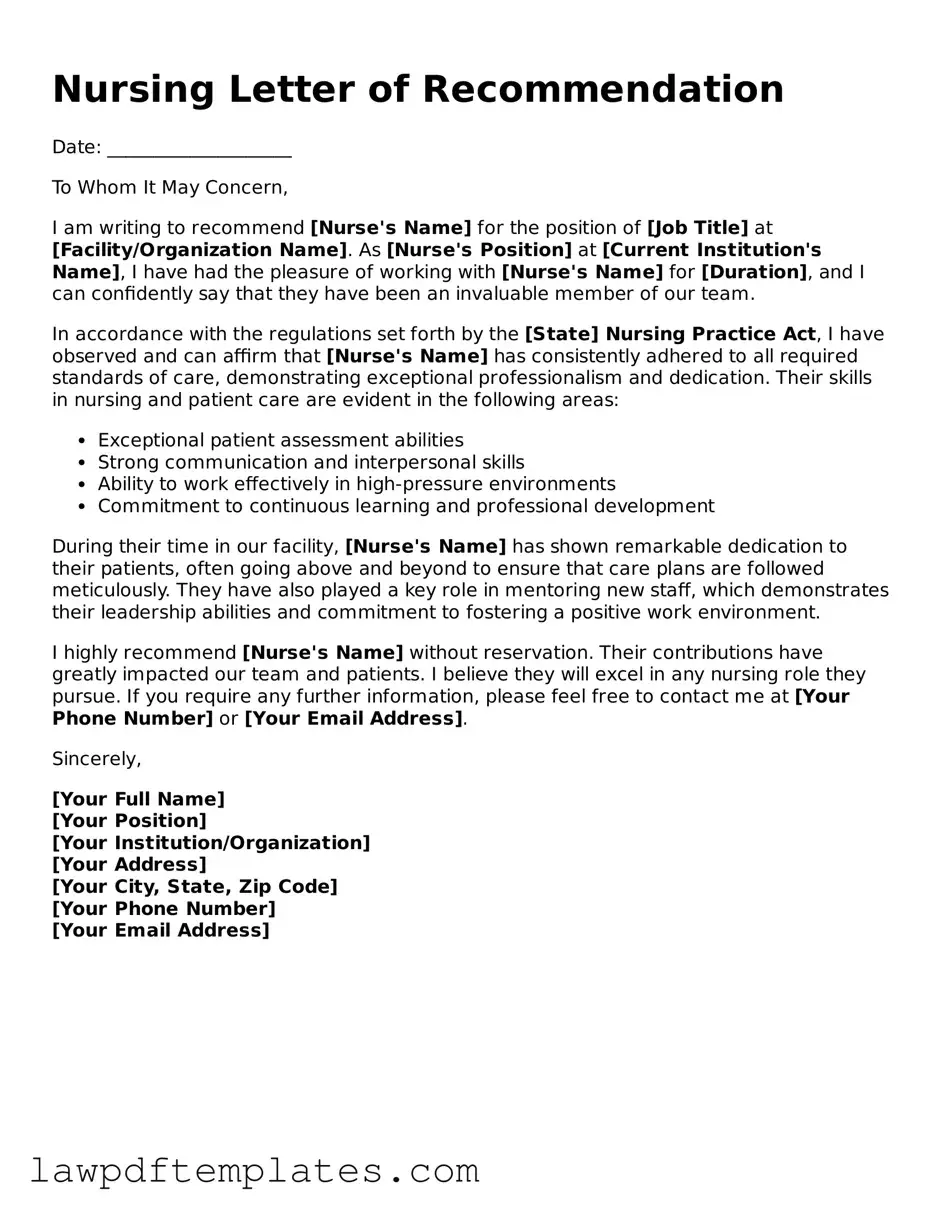Attorney-Approved Nursing Letter of Recommendation Document
Form Breakdown
| Fact Name | Description |
|---|---|
| Purpose | The Nursing Letter of Recommendation form is used to support an applicant's qualifications for nursing licensure or educational programs. |
| Eligibility | Typically, the form must be completed by a registered nurse or a licensed healthcare professional who can attest to the applicant's skills and character. |
| Format | The form usually requires specific information about the recommender, the applicant, and the context of their relationship. |
| Submission | Completed forms are often submitted directly to the nursing board or educational institution, sometimes requiring a signature or seal. |
| State-Specific Forms | Some states have unique requirements for the letter of recommendation, which may include specific forms or additional information. |
| Governing Laws | In California, for instance, the governing law is the California Business and Professions Code Section 2736. |
| Confidentiality | Letters of recommendation are often considered confidential, meaning the applicant may not have access to them. |
| Impact | A strong letter can significantly enhance an applicant's chances of acceptance into nursing programs or obtaining licensure. |
| Deadline | It is crucial to be aware of submission deadlines, as late submissions can jeopardize the application process. |
| Follow-Up | Applicants should follow up with their recommenders to ensure the letter has been submitted on time and to express gratitude. |
Sample - Nursing Letter of Recommendation Form
Nursing Letter of Recommendation
Date: ____________________
To Whom It May Concern,
I am writing to recommend [Nurse's Name] for the position of [Job Title] at [Facility/Organization Name]. As [Nurse's Position] at [Current Institution's Name], I have had the pleasure of working with [Nurse's Name] for [Duration], and I can confidently say that they have been an invaluable member of our team.
In accordance with the regulations set forth by the [State] Nursing Practice Act, I have observed and can affirm that [Nurse's Name] has consistently adhered to all required standards of care, demonstrating exceptional professionalism and dedication. Their skills in nursing and patient care are evident in the following areas:
- Exceptional patient assessment abilities
- Strong communication and interpersonal skills
- Ability to work effectively in high-pressure environments
- Commitment to continuous learning and professional development
During their time in our facility, [Nurse's Name] has shown remarkable dedication to their patients, often going above and beyond to ensure that care plans are followed meticulously. They have also played a key role in mentoring new staff, which demonstrates their leadership abilities and commitment to fostering a positive work environment.
I highly recommend [Nurse's Name] without reservation. Their contributions have greatly impacted our team and patients. I believe they will excel in any nursing role they pursue. If you require any further information, please feel free to contact me at [Your Phone Number] or [Your Email Address].
Sincerely,
[Your Full Name]
[Your Position]
[Your Institution/Organization]
[Your Address]
[Your City, State, Zip Code]
[Your Phone Number]
[Your Email Address]
Common mistakes
When filling out a Nursing Letter of Recommendation form, candidates often overlook critical details that can impact the effectiveness of their application. One common mistake is failing to provide specific examples of the candidate's skills and experiences. Generic statements do not convey the individual's unique qualifications. Instead, detailed anecdotes can illustrate their strengths and suitability for the nursing profession.
Another frequent error is neglecting to tailor the recommendation to the specific nursing program or position. Each program may have different requirements or values. A one-size-fits-all approach can diminish the letter's impact. Taking the time to address the unique aspects of the program shows that the recommender has invested thought into the letter.
In addition, some individuals forget to include their contact information. This omission can hinder the admissions committee's ability to reach out for further clarification or additional questions. Including a phone number and email address ensures that the committee can easily follow up if needed.
Moreover, many recommenders fail to proofread the letter before submission. Spelling and grammatical errors can detract from the overall professionalism of the recommendation. A well-written letter reflects positively on both the recommender and the candidate.
Another mistake is not adhering to the word limit or format specified by the nursing program. Each program may have specific guidelines regarding length and structure. Ignoring these guidelines can lead to an automatic rejection of the letter, regardless of its content.
Some recommenders also underestimate the importance of submitting the letter on time. Delays in submission can create complications for the candidate's application process. Meeting deadlines is crucial, as it demonstrates reliability and respect for the program's timeline.
Lastly, a lack of enthusiasm can undermine the letter's effectiveness. A recommendation that appears lukewarm or indifferent may raise questions about the candidate's qualifications. Expressing genuine support and confidence in the candidate's abilities can make a significant difference in how the letter is received.
Consider Popular Types of Nursing Letter of Recommendation Documents
Adoption Recommendation Letter - This adoption letter form seeks to collect diverse perspectives on adoptive candidates.
For those seeking to understand the importance of a Sorority Recommendation Letter in the recruitment process, it is crucial to learn how it can effectively showcase a candidate's strengths and suitability for membership opportunities.
